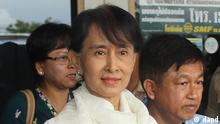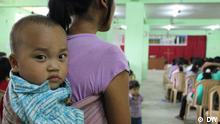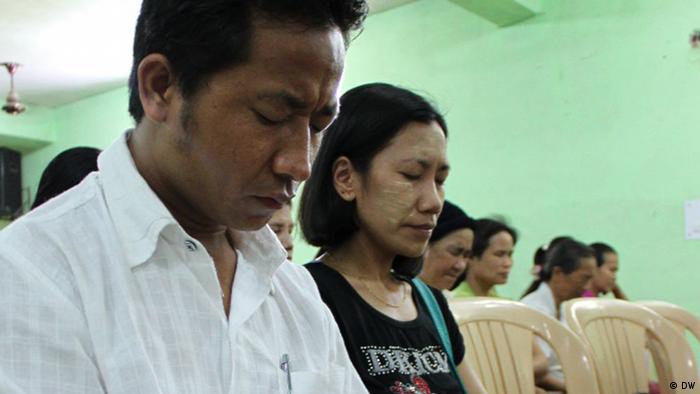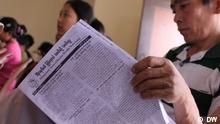After spending two decades under house arrest, Myanmar
opposition leader Aung Sang Suu Kyi is speaking abroad for the first
time in 24 years – will it help those who fled the country under the old
regime?
Long-time Burmese pro-democracy activist Aung San Suu Kyi will
make her first trip outside Asia since her release from house arrest to
present a speech to a labor conference in Geneva next week. Afterwards
she will travel to Norway to accept the Nobel Peace Prize – 21 years
after it was first awarded to her for her firm stance against the
tyrannical Burmese regime.
While the global community is keeping a keen eye on the newly
released Burmese opposition leader, Suu Ki’s international appearances
seem to be a positive sign of the political changes taking place in
Myanmar, which until recently was ruled by a dictatorial junta.
 Suu Kyi is to make her first speech outside Asia in two decades
Suu Kyi is to make her first speech outside Asia in two decades
Despite the ruling party having allowed Suu Kyi’s release from
house arrest, the junta maintains a tight grip on power, continues to
hold political prisoners and commits gross human rights violations
toward Myanmar’s ethnic communities.
Almost one third of Myanmar’s 60 million people belong to one
of the country’s 100 ethnic minority communities. Civilians living in
ethnic minority areas are the worst affected by the internal conflict
the country has endured over the past 60 years, according to the United
Nations Special Rapporteur on Human Rights in Myanmar.
But the political change taking place across the country means
little for the millions of Burmese refugees who have escaped religious
or political persecution and fled to South East Asian countries,
especially India’s capital, Dehli.
Fleeing persecution
Walking down a congested street in Dehli’s Vikaspuri
neighborhood on a Sunday morning, the sound of a church choir can be
heard singing in Burmese. More than 500 Burmese Christians gather in a
makeshift church – they escaped religious persecution and wound up
calling this bustling Indian community home.
Most of the people in the large room, above a shop in local
market area belong to the Zomi or Chin ethnic groups. The room is full –
most of women wear traditional red and black sarongs.
Sanlek, a 35-year-old refugee, came to Delhi in 2009. She says
the church brings back a lot of memories of home, a place she yearns to
return to. “We miss home, it is our land. We gave birth there, we
brought up our children there, we grew up there.”
 Political change in Myanmar has little effect on the refugees’s lives
Political change in Myanmar has little effect on the refugees’s lives
Sanlek remembers the evening in January 2009 when a group of
men in military fatigues stormed the village church next to her home.
They began arresting everyone for illegally practicing Christianity.
Sanlek was with her husband and four children when the men started
assaulting them. “They took my husband away. Then they beat me and
slapped and kicked my children, all four of them. After we fled from our
house, they burned it.”
During the commotion, Sanlek lost sight of her husband, but
managed to escape with her four children. They spent the night hiding in
the fields. The next morning, they boarded the first bus to the Indian
border with another family also forced to flee the village. It took nine
days to get to Manipur, India’s North Eastern state which shares a
border with Myanmar. There she stayed with her children for three
months, before moving to Delhi in April 2009. Twelve months passed
before she got news about her husband. “In December 2010, I got news he
was dead. It happened that day.” Sanlek’s husband was murdered the night
the uniformed men came to the village.
Pastor Lian Bawi was forced to flee to India after escaping an
attack on his life when he was trying to build a Christian church in his
local village. “The government, the military, they all want the people
to be Buddhists. But as Christians, we cannot leave our religion.” He
said even today Christian minorities which have remained in Western
Myanmar continue to be government targets. “We have no one to help us.
We are in a jungle, living in a jungle. We don’t have any protection, no
police to help us. They can kill us, beat us, do anything to us.”
 Nine thousand Burmese refugees call Delhi home
Nine thousand Burmese refugees call Delhi home
Hope for change
Like Sanlek and Pastor Bawi, thousands of Burmese fled Myanmar
because of religious and political persecution over the past decade. The
United Nations estimates over 400,000 Burmese have left due to the
injustices they suffered, with many crossing the border into Thailand,
Malaysia, Bangladesh and India.
In the city of Delhi, there are nearly 9,000 Burmese registered
with the UN Refugee Agency. Many of them are from Myanmar’s minority
groups. As a refugee in India, Burmese like Sanlek can earn a modest
living making candles or using their traditional skill of weaving.
In one community center for Burmese refugees, women sit on the
floor 12 hours a day operating looms. At lunchtime, they gather outside
on the street to cook a simple meal of rice and noodle soup. It’s the
only thing they can afford to eat on a daily basis.
Life as a refugee can be difficult. On the one hand, things in
Myanmar are apparently getting better. Yet none of the Burmese refugees
in India have volunteered to go back home, says Nayana Bose, from the UN
Refugee Agency. “Developments in Myanmar are certainly very positive.
But for the moment the refugees are obviously watching. They’re
following every news item they can see, they’re following it on the
Internet, in their discussions, they’re discussing it with each other.”
 Burmese refugees eagerly follow political developments
Burmese refugees eagerly follow political developments
Huddled over a computer in a tiny one-room apartment, Sanlek
and her roommates are reading about the political developments in their
country. They read about Aung San Suu Kyi’s victory in the recent
elections in Myanmar, her plans to travel internationally and the
ceremony that will take place when she is presented with the Nobel Peace
Prize, 24 years after it first being awarded to her. This news fills
Sanlek and her friends with hope. But, that hope soon fades. Even Suu
Kyi’s new role in Myanmar’s political system does not make them trust
the government that once gave orders to kill their families. They say
it’s the same people in power. The only difference: they don’t wear a
military uniform anymore.
The international community will continue to follow with great
interest the developments in Myanmar, and especially the actions of Suu
Kyi, as it appears she is the country’s best hope for a stable political
future.
But for now returning home feels like a distant dream for the
Burmese refugees living in India. For now, one thing that keeps them
going is their faith. They continue to pray that one day they will be
able to return home to Myanmar and live without fear.
Author: Pracheta Sharma, Delhi / jlw
No comments:
Post a Comment